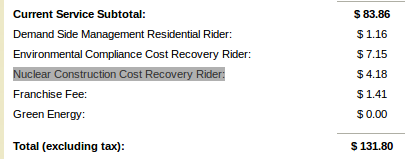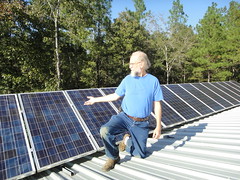 Paul Wolff showed us his programmable electric meter
at his house on Tybee Island.
Paul Wolff showed us his programmable electric meter
at his house on Tybee Island.
It shows night, day, evening hours….The still picture shows Paul and Gretchen comparing notes on solar generation and usage over time. He writes his on a pad of paper. She records hers on an iphone. Either way works.That’s exclusive of the solar. This is strictly what I’ve used off the grid. The solar, I keep a spreadsheet.
Here’s the video:
Programmable electric meter —Paul Wolff 2012 02 17
renewable energy,
Paul Wolff, The Volta Collaborative (TVC),
Tybee Island, Chatham County, Georgia, 17 February 2012.
Videos by Gretchen Quarterman for LAKE, the Lowndes Area Knowledge Exchange.
-jsq








